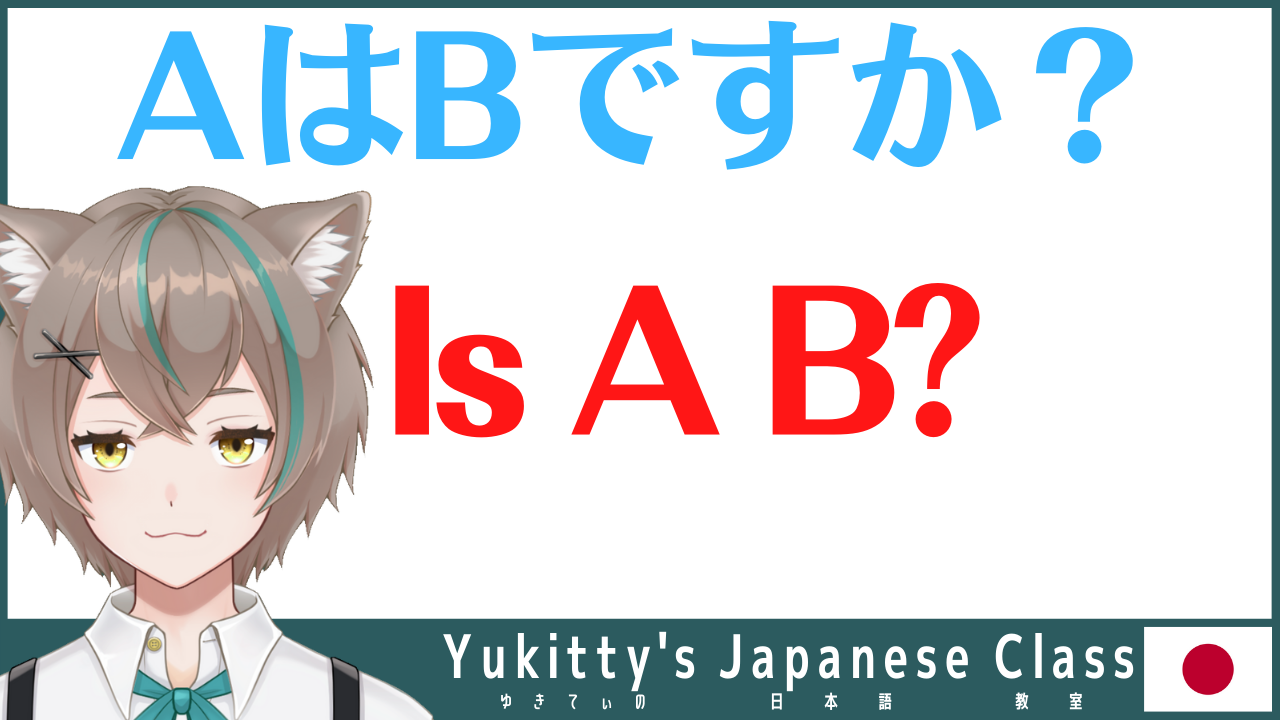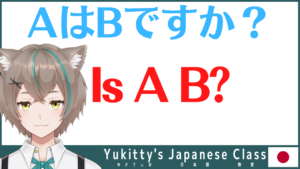


A は B ですか?
To make a question sentence, add “か?” at the end of the sentence.

It is not necessary to add a “?”, But I recommend adding it to make it easier to understand that it is a question sentence.
Are you Mr.Satoshi?
Is it tasty?
おいしい [I-adjective] tasty
Translate the following sentences into Japanese using the “AはBですか?”.
Is he Mr.Takeshi?
Is he Mr.Takeshi?
彼はたけしさんですか?
Is this sushi?
Is this sushi?
これは寿司ですか?
Due to the difference in grammatical structure, it may be better not to translate directly, but the basic translations are shown below.
| Japanese (Hiragana) | English | Kanji | Polite expression |
|---|---|---|---|
| だれ | Who | 誰 | 何方 or どちら様 |
| なに | What | 何 | – |
| いつ | When | 何時 | – |
| どこ | Where | 何処 | どちら |
| なぜ or どうして | Why | 何故 | – |
| どれ | Which | – | どちら |
| どんな, どうやって, どれくらい etc | How | – | どのように or いかが |
誰 and 何 are often written in Kanji but いつ, どこand なぜ are often written in Hiragana.
Who are you?
あなたは should be omitted if it is obvious.
どちら様ですか?
What is that?
When is your birthday?
誕生日 [noun] birthday
あなたの should be omitted if it is obvious.
Where is the toilet?
トイレ [noun] toilet, restroom, bathroom
Why do you think so?
そう [adverb] so
思う [verb] think (思い is conjugational form)
あなたは should be omitted if it is obvious.
Which is her smartphone?
スマホ [noun] smartphone
How will you come?
来る [verb] come (来 is conjugational form)
あなたは should be omitted if it is obvious.
| Japanese | Pronunciation | English | Another way |
|---|---|---|---|
| ペン | pen | pen | – |
| パソコン | pasokon | PC (personal computer) | PC |
| スマホ | sumaho | smartphone | スマートフォン |
| 机 | tsukue | desk | デスク |
| 椅子 | isu | chair | チェア |
| 誕生日 | tanjoobi | birthday | – |
| 期日 | kijitsu | due date | – |
| 予定 | yotee | schedule, plan, expectation | 計画 |
| 入口 | iriguchi | entrance | – |
| 出口 | deguchi | exit | – |
| トイレ | toire | toiret, bathroom, restroom | 便所 |
| 駅 | eki | station | – |
| バス停 | basutee | bus stop | – |
| 空港 | kuukoo | airport | – |
| Japanese | Pronunciation | English |
|---|---|---|
| いくつ | ikutsu | How many, How old (for age) |
| いくら | ikura | How much (for price) |
| どれくらい | dorekurai | How much (for uncountables), How long, How far, How good etc. |
1. How old are you?
2. How many would you like to?
1. (あなたは)おいくつですか? *あなたは is omitted. *お is added before いくつ that is a polite expression.
2. (あたなは)おいくつ(欲しい)ですか? *When shopping or counting, いくつ means “How many”.
欲しい [I-adjective] want, would like, desire
How much is this?
(これは)おいくらですか? *これは is omitted. *お is added before いくら is a polite expression.
How long does it take?
(それは)どれくらい(時間が)かかりますか? *それは and 時間が are omitted if they are obvious in the context.
時間 [noun] time
時間+が+かかる [noun+particle+verb] take time
How far is it?
(それは)どれくらい遠いですか?
遠い [I-adjective] far
Translate the following sentences into Japanese using “誰, 何, いつ, どこ, なぜ or どんな”.
Who is she?
Who is she?
彼女は誰ですか?
What is it?
What is it?
それは何ですか?
When is his birthday?
When is his birthday?
彼の誕生日はいつですか?
Where is the station?
Where is the station?
駅はどこですか?
Which is my chair?
Which is my chair?
私の椅子はどれですか?
Why is the sky blue?
空 [noun] sky
青い [I-adjective] blue
Why is the sky blue?
空はなぜ青いのですか?
のですか? In question sentences that use “Why”, add の after the predicate.
How often do you see your girlfriend?
彼女 [noun] girlfriend, she
頻度 [noun] frequency (, often)
会う [verb] see, meet, encounter, get together, come across
How often do you see your girlfriend?
(あなたは)彼女とどれくらいの頻度で会いますか?



Practice for “why” and “how” will be described in another article later, because it is a little difficult for beginners.


この記事が気に入ったら
フォローしてね!
Comment